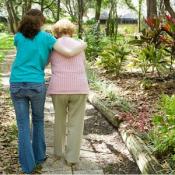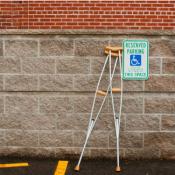 On November 4, 2014, Oregon resident Jillian McCabe drew international attention when she threw her 6-year-old autistic son to his death, over the side of the Yaquina Bay Bridge. Public response to the horrific event was divided. While some people, particularly parents of disabled or autistic children, advocated vigorous prosecution, others felt pity—pointing to the daunting physical, psychological, and emotional challenges McCabe faced while caring for her family.
On November 4, 2014, Oregon resident Jillian McCabe drew international attention when she threw her 6-year-old autistic son to his death, over the side of the Yaquina Bay Bridge. Public response to the horrific event was divided. While some people, particularly parents of disabled or autistic children, advocated vigorous prosecution, others felt pity—pointing to the daunting physical, psychological, and emotional challenges McCabe faced while caring for her family.
Jillian McCabe was a live-in caregiver for her autistic son, as well as her husband who developed multiple sclerosis shortly after their son’s birth. She regularly blogged about the stress and frustration she faced as a caregiver and frequently stated that she was “trying to hold it together.” McCabe complained about hearing voices, which suggests that she may even have been experiencing symptoms of a serious mental health issue. Relatives also reported that she tried to commit suicide several times. Despite McCabe’s efforts to get help, relatives say she did not receive the services she needed.
While these psychological symptoms and the added stress of being a caregiver to multiple people certainly do not excuse an act of murder, it is possible that they played a role in the tragic outcome of the McCabe family. Could preventative steps have been taken?
A Caregiver’s Job Description
An estimated 44 million adults serve as caregivers in the United States today, and the stress can take a toll on their emotional and mental health.
Denver therapist Andrea M. Risi, LPC, a Topic Expert in health, illness, and medical issues, explains, “Caregiving means to help another person who is coping with a disability or illness without being compensated. Important qualities in a caregiver include empathy, patience, and reliability.”
Caregiving is not an easy task. It usually occurs within immediate families, but it can spread to friends and extended family members. A typical caregiver’s job description includes comforting companionship (e.g., conversation, stabilization while walking), domestic assistance (e.g., housekeeping, running errands), and personal care (e.g., bathing, grooming, toileting), without financial compensation.
Caregiving is widely viewed as a vital national health care resource worth an estimated $306 billion annually. However, most caregivers are ill-prepared to effectively fulfill their role, and many do not receive third-party support. Studies show that the strains of caregiving, coupled with a lack of caregiver support, can have serious consequences on a caregiver’s health.
How Caregiving Affects a Person’s Health
The mental, emotional, and physical demands of caring for chronically ill or disabled relatives can be particularly debilitating for caregivers. According to the Family Caregiver Alliance (FCA) (2006), more than one-third of America’s live-in caregivers provide health care assistance to others despite experiencing bad health themselves.
The FCA also reports that caregivers show higher levels of depression than family members who do not have caretaking responsibilities. It is estimated that 25% to 50% of caregivers meet the diagnostic criteria of major depression, and 40% to 70% show significant depressive symptoms. People who fill caregiving roles are also at higher risk of developing concurrent anxiety issues, chronic diseases, and substance dependence.
Caregivers also tend to experience higher levels of stress and frustration. A study by Schulz and Sherwood (2008) posits that caregiving is equipped with all the features of a chronic stress experience with high levels of unpredictability, uncontrollability, vigilance, and physical and psychological strain being major contributing factors. Roughly 26% of caregivers report feeling emotionally drained, and chronic caregiver stress has been linked with cognitive decline, including deficits in attention, memory, and verbal ability.
It is important to note that caregivers tend to go through greater psychological and emotional distress as the care-receiver’s functionality deteriorates (as in the case of a person with dementia), and these feelings might persist even after the care-receiver is placed in a nursing home.
Physical setbacks may also be experienced during caregiving. Caregivers are at greater risk for headaches, bodily pain, obesity, high blood pressure, heart disease, and cancer. Caregiver stress can also contribute to increased mortality. Elderly spousal caregivers (aged 66-96), who are exposed to caregiver stress, have a 63% higher mortality rate than non-caregiving peers of the same age.
How to Help Yourself or Another Caregiver
While the quintessential caregiver role involves the administering of treatment, it must be remembered that caregivers, too, are in need of care. One way for people to effectively manage caregiver stress and depression is to seek the assistance of a therapist.
“Therapy can help the caregiver cope with his or her own feelings about the other person’s illness. Often, involved family or friends have strong opinions about the course of care, and that can add stress to the caregiver. Having an unbiased person to talk to, like a licensed therapist, can help offer the caregiver different perspectives and insights into overseeing the person’s care. It can also help the caregiver deal with the mixed feelings and emotions that come with caregiving,” Risi said.
For individuals experiencing caregiver stress, Risi suggests the following practical points to facilitate effective and healthy caregiving:
- Take care of yourself. It is important for the caregiver to recognize his or her own needs and tend to them first. If you are experiencing burnout, you will not be able to effectively help the person in need of care.
- Ask for help. Caregiving does not have to be solely your responsibility. Some caregivers have a difficult time asking for help from others, but getting support to share the responsibility can help you avoid caregiver burnout.
- Be realistic about the illness and prognosis. Educate yourself and ask questions in order to be prepared for the reality of the illness.
- Use respite care services. A wide range of services are available to give a break to caregivers and can last from a few hours to a few days. Informally, you can ask another family member or a friend to give you a break, but there are formal respite services available in most communities. Use this time to recharge and look after yourself.
- Find emotional support. You can talk with family, trustworthy friends, a support group, your pastor, or a therapist. Having someone to share your feelings with can help ease the burden of caregiving.
Other Caregiver Resources
- The National Alliance on Mental Illness (NAMI) provides a variety of education and support programs for family members of a person with a mental health condition, free of cost. These include NAMI Family-to-Family, NAMI Basics, and NAMI Family Support Group.
- For caregivers of people experiencing Alzheimer’s disease, the Alzheimer’s Foundation of America invites you to reach out for care by calling (866) 232-8484 for general information, counseling, and referrals to nationwide resources
- The U.S. Department of Veterans Affairs (VA) provides many resources for caregivers of military veterans. These include a toll-free caregiver support line (855) 260-3274, a caregiver support coordinator, adult day health care centers (ADHC), home-based primary care (HBPC), skilled home care, the homemaker and home health aide program, home telehealth, respite care, and home hospice care.
- Additionally, every Wednesday at 8 a.m., 12 p.m., and 8 p.m. Eastern Time during National Family Caregivers Month in November, the VA invites caregivers for military veterans to call (800) 767-1750, enter access code 73687 and press the # button. Caregivers will be treated to meditation activities on the phone, which will help them relax and restore their balance.
References:
- Alzheimer’s Foundation of America. (2014). Caregiving tips: Strategies for success. Retrieved from http://www.alzfdn.org/EducationandCare/strategiesforsuccess.html
- Family Caregiver Alliance. (2006). Caregiver health. Retrieved from https://caregiver.org/caregiver-health
- Fantz, A. (2014). Mom blogged about son with autism she’s accused of killing. Retrieved from http://edition.cnn.com/2014/11/05/justice/oregon-mother-autism-son-death/index.html
- National Alliance on Mental Illness. (n.d.). Education, training and peer support center. Retrieved from http://www.nami.org/template.cfm?section=Education_Training_and_Peer_Support_Center
- Schulz, R. & Sherwood, P. R. (2008). Physical and mental health effects of family caregiving. American Journal of Nursing, 108 (9), 23-27. doi: 1097/01.NAJ.0000336406.45248.4c
- United States Department of Veteran Affairs. (2014). VA caregiver support. Retrieved from http://www.caregiver.va.gov/support/support_services.asp

The preceding article was solely written by the author named above. Any views and opinions expressed are not necessarily shared by GoodTherapy.org. Questions or concerns about the preceding article can be directed to the author or posted as a comment below.

 Caregiver Burnout: When Someone You Love Is Chronically Ill
Caregiver Burnout: When Someone You Love Is Chronically Ill 5 Factors that Contribute to Depression in Caregivers, Part I
5 Factors that Contribute to Depression in Caregivers, Part I 5 Factors that Contribute to Depression in Caregivers, Part II
5 Factors that Contribute to Depression in Caregivers, Part II

Please fill out all required fields to submit your message.
Invalid Email Address.
Please confirm that you are human.
Leave a Comment
By commenting you acknowledge acceptance of GoodTherapy.org's Terms and Conditions of Use.